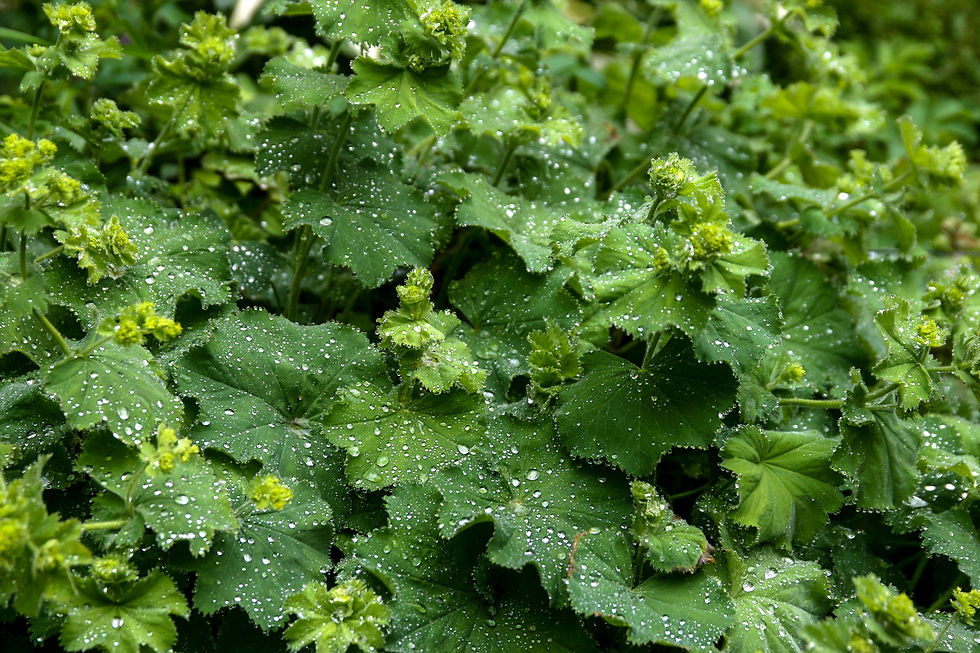Four herbs for the 4th trimester
- Poppy

- Feb 21, 2019
- 4 min read
Although pregnancy technically ends with childbirth, the 3 months after birth is often the most challenging time for new mothers and is referred to by many as the ‘4th trimester’.
Our hormones are going through massive shifts, our breasts are turning into mini milk factories, our bodies are recovering from potentially traumatic birth experiences, and our minds are grappling with the enormity of what lies ahead.

All the while we’ve got a tiny baby demanding round the clock care and, after a few weeks’ rest, we’re expected to kick into gear and become Supermum, complete with flat stomach and beaming face. Ha!
Below are four herbs that helped me stay healthy and sane over the last 3 months.
Damask rose (Rosa damascena)
I’ve written about Rose’s soothing qualities before - it’s a herb I use everyday in my practice for those going through loss, grief or bereavement. It works on the heart to help cultivate a renewed sense of self-worth after traumatic life events.
It seems to me the perfect herb for the early postpartum period, where many women will be recovering from the labour of birth whilst mourning the loss of an identity and moving forward into motherhood.
Like a “hug in a mug”, rose calms the nervous system and allays anxiety. It prevents excessive self-judgement and gives us the confidence we need to get through those early weeks.
Like a “hug in a mug”, rose calms the nervous system and allays anxiety.
Infuse fresh or dried rose petals with any of the herbs below in boiled water for 10-15 minutes, and drink 2-3 cups a day. You can also make a delicious cold infusion, soaking the petals in water at room temperature for 20-30 mins.

Lady’s Mantle (Alchemilla vulgaris)
Alchemilla (pictured above) was given its name by alchemists who believed that the morning dew that collected on the leaves of the plant had magical properties, and that by collecting it they could make precious jewels and metals.
I regularly prescribe Lady’s Mantle for uterine (womb) healing - either due to surgery, fibroids, abortion, miscarriage or a difficult birth. It’s astringent, antispasmodic and helps promote lymphatic circulation, which aids in the shrinking of the uterus back to its normal size after birth.
Traditionally it’s also an anxiolytic, helping to calm the nervous system and heal sexual or gynaecological trauma. The leaves can be infused fresh or dried as above, in a mix or on their own.
I regularly prescribe Lady’s Mantle for uterine healing - either due to surgery, fibroids, abortion, miscarriage or a difficult birth
Fennel (Foeniculum vulgare)
Of all the herbs that are said to improve breast milk production, fennel is my favourite - mostly because there are a few scientific studies confirming its efficacy, and because it really worked for me.
Fennel has the added benefit of being a carminative herb, which can help ease trapped wind in newborn babies (when consumed through the breast milk), and it is also easy to find. Other breast milk promoting herbs include fenugreek, aniseed and caraway.
If you have real trouble with breast milk production in the early weeks as I did, sip strong fennel tea, along with any of the other herbs above, all day long for quick, reliable effects.
For trouble with breastmilk production, sip strong fennel tea all day long for quick, reliable effects.
However I can’t stress enough how important it is to seek advice from a good breastfeeding consultant as well. I highly recommend Ana Custódio of Amamenta Algarve - without the expert advice of this amazing woman our early weeks would have been very different.

Ashwagandha (Withania somnifera)
This all-in-one blockbuster of a herb is a great one for balancing hormones, calming the nerves and providing nourishment during the fourth trimester. It’s an adaptogen - a class of herbs that help increase the body’s resilience to stress by acting simultaneously on the nervous, immune and endocrine (hormonal) systems.
Right after birth the female hormones oestrogen and progesterone drop significantly, which commonly leads to an initial, temporary bout of the ‘baby blues’. Later on however, a combination of continuing hormonal imbalance, nutritional deficiencies and thyroid dysfunction can result in the more severe and long-lasting condition known as postpartum depression.
By supporting thyroid hormone production, reducing anxiety, promoting healthful sleep and providing important nutrients such as iron, Ashwagandha is my number one herb for preventing this challenging and complex condition from developing in new mums.
Ashwagandha is my number one herb for preventing postpartum depression in new mums.
The herb is best taken in powdered form - 1-2 teaspoons per day in hot milk (coconut, almond, hemp or oat) mixed with some molasses for extra iron, for a great bedtime or soothing afternoon drink.
Postpartum supplements
Nourishing teas like nettle and red raspberry leaf will also help to provide important minerals during the postpartum period, and a good fish oil supplement, lots of sunshine and some high quality probiotics will support you and your baby’s brain function, immune system and gut flora development during this crucial time.




Comments